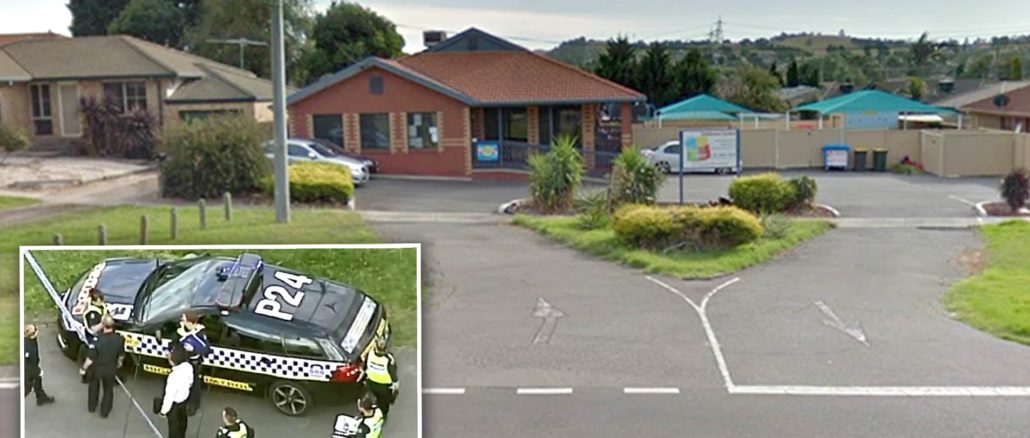
TUESDAY, October 15
Police have revealed the cause of a tragic accident that left a three-year-old girl dead in a Melbourne childcare centre car park.
The girl and a 26-year-old woman, both from Broadmeadows, were hit by a car in the McDonalds Road carpark of the centre in Epping about 4.45pm yesterday.
The woman was taken to hospital with non-life threatening injuries and the little girl died at the scene.
A police spokesperson today confirmed the driver of the car was attending to another child in the back seat when the vehicle moved backwards.
It is not yet known what caused the vehicle to reverse and the investigation is ongoing, police say.
Three other children, who were occupants of the car, were uninjured.
Detective Sergeant Daryll Out described the incident as “terrible” last night.
“The incident occurred when a car accidentally struck the young girl,” he told reporters, adding he could not give further information about how it happened.
####
America’s economic attack on Turkey over its onslaught against the Kurds in Northern Syria has started, with US President Donald Trump raising steel tariffs on Turkey and threatening more sanctions.
The move comes as Mr Trump scrambles to limit the damage from his much-criticised decision to clear US troops from Turkey’s path.
In a statement on Twitter, Mr Trump said he would sign an executive order permitting sanctions to be imposed on current and former Turkish officials and “any persons contributing to Turkey’s destabilising actions”.
The statement also announced plans to reimpose steel tariffs and immediately halt negotiations on a $US100 billion trade deal.
“Turkey’s military offensive is endangering civilians and threatening peace, security and stability in the region,” the statement said, adding that Turkey’s actions were “setting conditions for possible war crimes”.
The Turkey attack began after Mr Trump ordered American troops in northern Syria to step aside, clearing the way for Turkey.
Since 2014, the Kurds have fought alongside the US in defeating the Islamic State in Syria, and Mr Trump’s move was decried at home and abroad as a betrayal of an ally.
In a series of Tweets on Monday evening (local time), Mr Trump dismissed any US responsibility to protect its Kurdish allies, saying they are “7,000 miles away” and “presided over by Bashar al-Assad, our enemy”.
In the statement, Mr Trump said the roughly 1,000 US troops he ordered to leave Syria would remain in the Middle East to prevent a resurgence of the Islamic State threat.
The troops would “redeploy and remain in the region”, he said, describing their mission as “monitoring the situation” and preventing a “repeat of 2014” when IS fighters in Syria swept into neighbouring Iraq and took control of Iraq’s north and west.
As US troops left, the Kurds turned to the Syrian Government for protection, reaching a deal with President Bashar Assad’s Government to help them fend off Turkey’s invasion on Sunday night.
####
French-American economist Esther Duflo has become only the second female economics winner in the Nobel Prize’s 50-year history, as well as the youngest at 46.
She shared the award equally with Indian-born American Mr Abhijit Banerjee — who is also her husband — and Mr Michael Kremer, also of the United States, for their work in fighting poverty that has helped millions of children around the world.
The Royal Swedish Academy of Sciences said their work had shown how poverty could be addressed by breaking it down into smaller and more precise questions in areas such as education and healthcare, making problems easier to solve.
It said the results of their studies and field experiments had ranged from helping millions of Indian schoolchildren with remedial tutoring, to encouraging governments around the world to increase funding for preventative medicine.
“It starts from the idea that the poor are often reduced to caricatures and even the people that try to help them do not actually understand what are the deep roots of [their] problems,” Ms Duflo said.
“Our goal is to make sure that the fight against poverty is based on scientific evidence,” she added of an approach that has included evaluating the impact of often obvious-sounding problems such as a lack of textbooks or teacher absence.
The team have notably been associated with the ‘Teaching at the right level’ program, which has helped 60 million children in India and Africa and focuses on maths and reading skills for primary school pupils.
Ms Duflo said the importance of the two most commonly cited approaches to tackling poverty — foreign aid and freeing up trade with poor countries — had often been “overstated”.
While the United Nations estimates that global poverty has been cut by more than half since 2000, it says one in 10 people in developing regions still live on less than $US1.90 a day. In sub-Saharan Africa, that proportion is 42 per cent.
Asked whether Ms Duflo’s award was an attempt to redress the gender imbalance in the prize’s history, Peter Fredriksson, chairman of the Nobel Committee for Economic Sciences, said it showed that women were now more present in economics.
Ms Duflo remarked that it came at an “extremely important and opportune time” for women in a sector that has traditionally been very male-dominated.
“We are at a time when we are starting to realise in the profession that the way that we [treat] each other privately and publicly is not conducive all the time for a very good environment for women,” she said.
SheSociety is a site for the women of Australia to share our stories, our experiences, shared learnings and opportunities to connect.

Leave a Reply